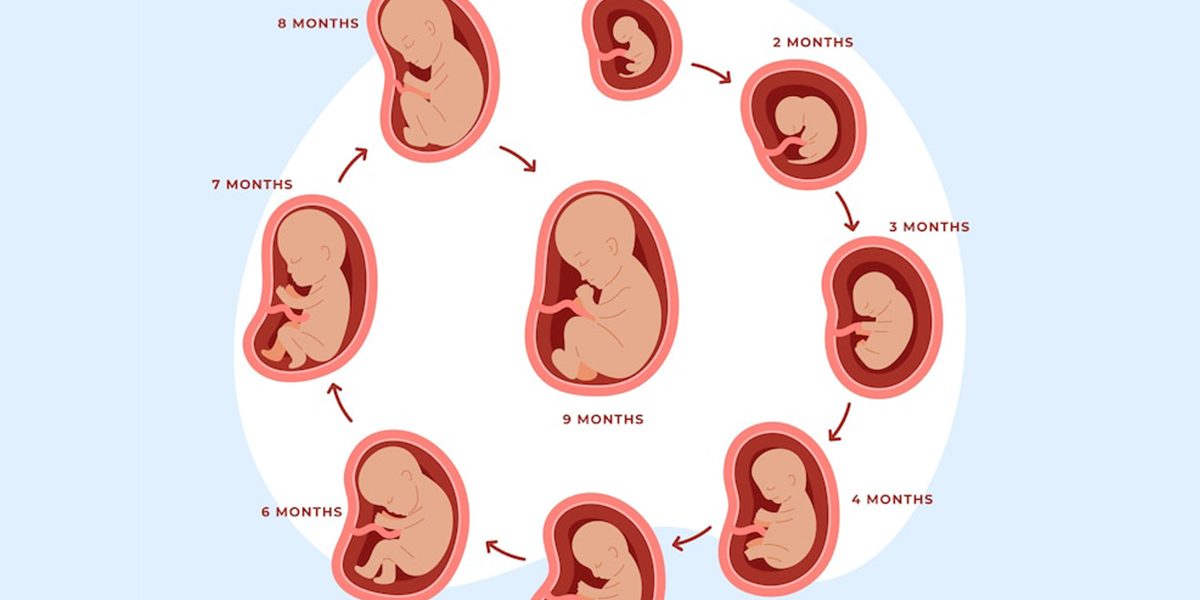The journey of pregnancy is a miraculous and intricate process that unfolds in three distinct stages, each marked by profound changes in the developing foetus. As we dive deep into the stages of Foetal Development, it is essential to grasp the awe-inspiring transformation that occurs within the womb. This Foetal Development week-by-week in pregnancy guide will take you through the astonishing journey, shedding light on the nuances of each stage – the germinal, embryonic, and foetal.
Germinal Stage (Weeks 1-2)
This intricate process unfolds within the context of the menstrual cycle, where a mature egg is released during ovulation(what is ovulation). The journey commences at conception, as a sperm and egg unite to form a zygote. If fertilization occurs, the zygote goes on a one-week voyage to the uterus, dividing rapidly along the way.
As cell division unfolds, two structures emerge, one evolving into the embryo and the other forming the placenta. Implantation into the uterine lining signals the start of a new chapter, halting the menstrual cycle and heralding the onset of pregnancy.
Embryonic Stage (Weeks 3-8)
The embryonic stage, spanning the third to the eighth week, witnesses the transformation of the blastocyst into a recognizable embryo. Organs and structures such as the neural tube, heart, limbs, and facial features take shape.
By the eighth week, morning sickness may make its debut, marking a phase of rapid organogenesis. This period sets the stage for the impending foetal stage, and the embryo officially becomes a foetus.
Foetal Stage (Weeks 9-Birth)
This stage commences at week nine and continues until birth, is characterized by the growth and maturation of the developing foetus. The assignment of the foetus’s sex occurs around week nine, though it remains undetectable through ultrasound.
From the growth of fingernails and eyelashes to the initiation of limb movements, this stage showcases the remarkable development of the foetus. By the end of this stage, the foetus will have undergone significant growth in both weight and length.
The Duration of Pregnancy: 40-Week Journey
While traditionally viewed as a nine-month process, a full-term pregnancy spans 40 weeks or 280 days. Calculated from the first day of the last menstrual period (LMP), this gestational age provides a reference point for determining due dates and monitoring the progression of pregnancy.
Foetal Development Week-by-Week
First Trimester
From the subtle beginnings of pregnancy to the emergence of human features, the first trimester is marked by the development of the foetus from a small grouping of cells to a recognizable form, often accompanied by the onset of symptoms like morning sickness.
Month 1 (Weeks 1-4):
This is marked by the release of hormones and the initiation of a potential pregnancy.
Month 2 (Weeks 5-8):
Recognition of pregnancy as human features emerge, and the heartbeat becomes detectable.
Month 3 (Weeks 9-12):
Transition from embryo to foetus, accompanied by the formation of facial features and the beginning of teeth development.
Second Trimester
Regarded as a more comfortable phase, the second trimester witnesses the blossoming of the foetus. This period is often characterized by the revelation of the foetus’s assigned sex, the growth of distinct features, and the onset of movement, providing a tangible connection between the mother and the developing life within.
Month 4 (Weeks 13-16):
The onset of visible signs of pregnancy, including the growth of fine hair and the development of external genitals.
Month 5 (Weeks 17-20):
The foetus’s movement becomes palpable, and ultrasound reveals the first glimpses of its assigned sex.
Month 6 (Weeks 21-24):
The foetus’s skin takes on a reddish hue, and coordinated limb movements become frequent, preparing for more purposeful actions.
Month 7 (Weeks 25-28):
Continued maturation, response to stimuli, and the foetus’s increasing awareness of its surroundings mark this stage.
Third Trimester
The final stretch of pregnancy is dedicated to preparing the foetus for birth. Rapid weight gain, the maturation of internal systems, and the foetus’s positioning in the womb define this crucial stage as the anticipation for labour and delivery intensifies.
Month 8 (Weeks 29-32):
Rapid brain development and increased control over body temperature characterize this phase, setting the stage for the final weeks of preparation.
Month 9 (Weeks 33-Birth):
The concluding stage, focusing on the foetus’s growth, lung development, and positioning for birth.
Month 10 (Weeks 37-40):
The final stretch, characterized by the potential onset of labour and the readiness of the foetus to meet the world.
To conclude
From the initial spark of conception to the culmination of a 40-week journey, understanding the stages of foetal development offers profound insights into the miraculous process of bringing new life into the world. As expectant parents navigate the transformative path of pregnancy, this Foetal Development week-by-week guide serves as a compass, shedding light on the awe-inspiring journey that culminates in the birth of a precious life.








